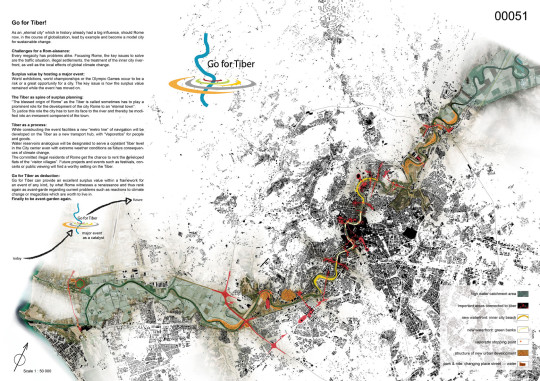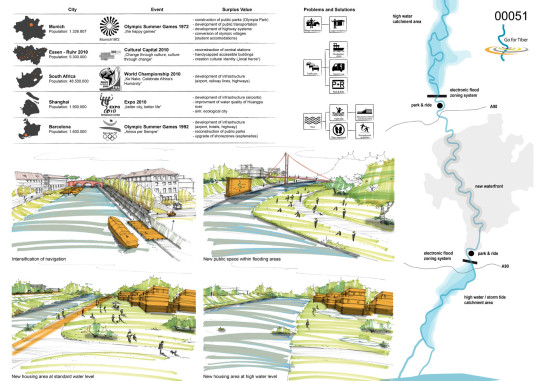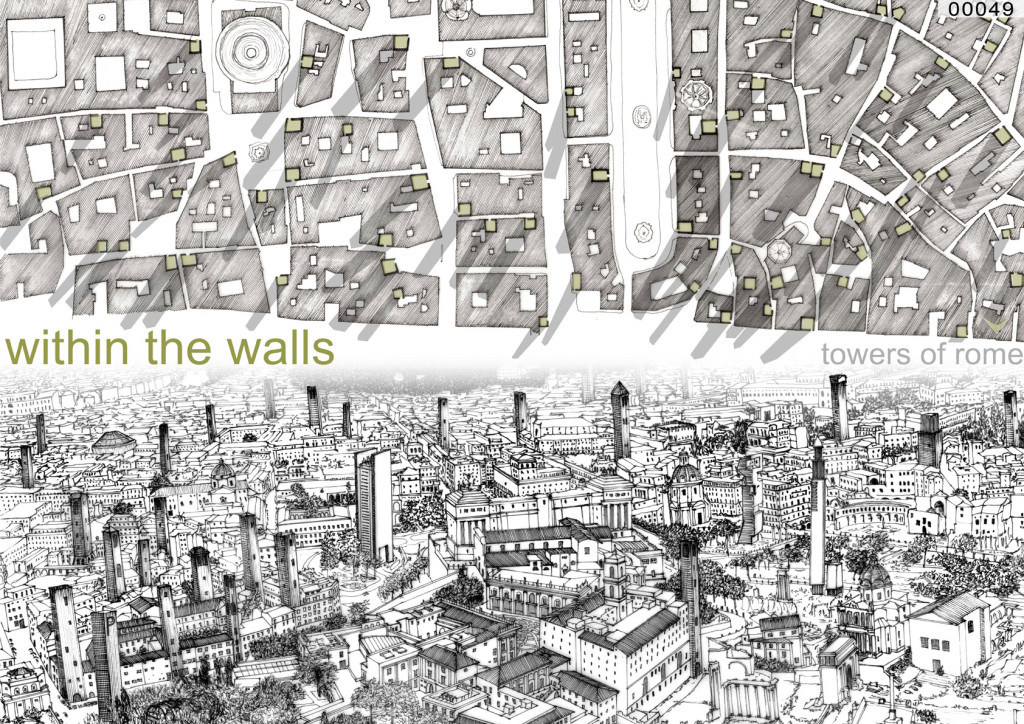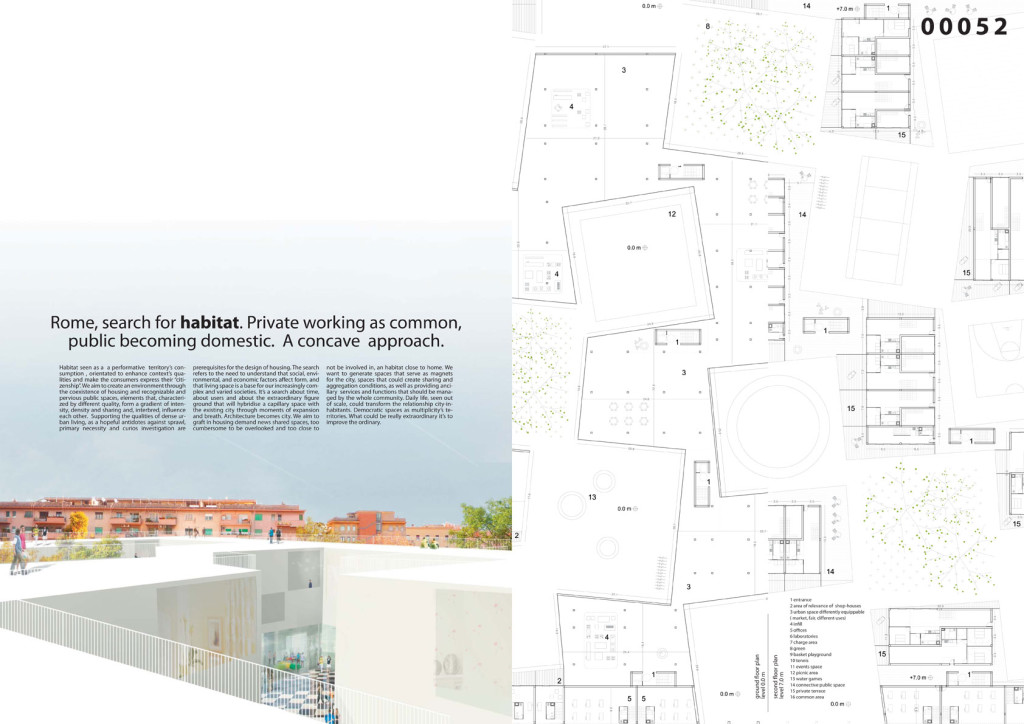Info:
Title: Go for Tiber - Code: 00051Contest: Rome / 2010
By: A. R. Dittrich / K. Gartenlöhner / H. Li / J. Mettler / C. Schepers / X.- Shen / S. Weber / X. Ye / K. Zimmermann
Views: 2587 Likes: 0
Votes:
JUERGEN MAYER H. 0 FRANCESCO LIPARI6 FELIPE ESCUDERO6 FRANCESCO GATTI 6 MICHAEL CATON 44.4
Go for Tiber


GO FOR TIBER
Romewas once the political and economic avant-garde withinEurope.
Besides road construction, trade and monetary system have been acquired;
the city itself was one of the world’s first megacities.
TodayRomedoes not own this exemplary function any more.
But as an „eternal city” which in history already had that big influence, Rome should now, in the course of globalization, lead by example and become a model city for sustainable change.
But how can a Renaissance of Rome get started?
Challenges for a Rom-aissance:
Every Megacity has problems alike. FocusingRome, the key issues to solve are the situation of mobility, illegal settlements, the treatment of the inner city riverfront, as well as the local effects of global climate change.
Permanent traffic jams are located in the inner city as well as on access and departure nods along the ring motorway. By contrast plenty of small illegal settlements can predominantly be found along theTiber. On reaction to climate change a two-front approach is necessary. Related to this the rise of the sea level and more extreme weather conditions have to be considered.
As an initial approach those problems should not be hidden from the world, rather be demonstrated, discussed and transformed. Such a strategy requires high investment costs.
How can we solve this question of funding?
Surplus value by hosting a major event:
World exhibitions, world championships or the Olympic Games occur to be either a risk or a great opportunity for a city. The example of the FIFA World Cup inJapanhas to be assessed retrospectively negative. The lack of anchoring of football as a national sport as well as poor infrastructure and accessibility prevent from a viable re-use of the buildings put up for the World Cup.
The chance of surplus value has not been utilized fundamentally.
But many other cities likeMunich,ShanghaiorBarcelonacould both benefit from the event and the re-use, to enhance the city sustainably. In this course the infrastructure, mainly the public transport could benefit enormously. And on the precious example ofShanghai, one can observe how the water quality of a river can be effectively improved.
The surplus value remained while the event has moved on!
The Tiber as spine of surplus planning:
“The blessed origin ofRome” as the Tiber is called sometimes has to play a prominent role for the development of the cityRometo an “eternal town”. To justice this role the city has to turn its face to the river and thereby be modified into an immanent component of the town.
And it’s even indifferent which event may ever be realized.
How can theTiberturn into and maintain as a spine?
Tiber as a process:
Due to the consequence of water engineer approach the current situation shows the river`s presence in Rome as a hidden, sometimes forgotten landmark and it should be added that the river is poorly or sometimes not accessible at all.
You are not able to experience the river even if you reside in the immediate vicinity.
The high tides are managed within the bordered river bed, the flow rate is high and the water quality is comparatively low.
While constructing the event facilities a new “metro line” of navigation will be developed on theTiberas a new transport hub, with “Vaporettos” for people and goods. This transport system is connected with three park&ride sites, one at the airport, and the others at the intersections with the highway loop. It`s main function is the connection within essential locations from the northern areas to Lido Di Ostia in the south. The further transportation is done by electricity cars such as the E-Ape.
Illegal residents shall be tied into society by integrating them into construction activities on buildings, for example the “visitor villages” or infrastructure. The untapped or forgotten areas along theTiberwill be tracked down and assigned to a new use, like housing or functions of public- and urban space.
Temporary Water reservoirs in size comparable to the Sylvensteinspeicher inGermanywill be designated to serve a constantTiberlevel in the City center even with extreme weather conditions as future consequences of climate change. The water will be buffered from North East (in winter) and at the same time storaged for future much more dry summer times. Simultaneously the city is again buffered by flooding areas against increasing sea level and tempest from the other side. Of course effected agricultural or housing use has to adapted within the system.
While the major event takes place, illegal residents will be involved to serve the tourism, such as shipping and logistic needs for the event. The transport systemTiberrelieves the other entire infrastructure in these days. The additional happenings such as public viewing will be concentrated around theTiber.
Past the major event the transport hub along theTiberincluding park&ride sides will remain and will be maintained hereafter. Further structures created for the major event will be reused. For instance the Tiber beaches keep on decreasing recreational pressure on Ostia`s beach sides in close and traffic reduced distance to housing.
The committed and former illegal residents ofRomeget the chance to rent the developed flats of the “visitor villages” at low rents. Future projects and events such as festivals, concerts or public viewing will find a worthy setting on theTiber.
The planning will show long living prospects, which will exceed the major event.
Go for Tiber as deduction:
Go for Tiber can provide an excellent surplus value within a framework for an event of any kind, by what Rome witnesses a renaissance and thus rank again as avant-garde regarding current problems such as reactions to climate change or megacities which are worth to live in.
Finally to be avant-garden again.






